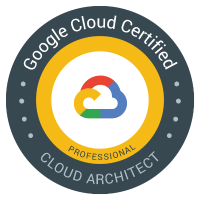Google - PCA Certification Exam Details, Questions and Answers
Certification Provider
GoogleExam
PCA: Professional Cloud ArchitectNumber of questions (in our database)
271Updated on
25 January 2024
Topics
Professional Cloud Architect Certification Exam
The Professional Cloud Architect exam is a certification offered by Google to validate and recognize IT professionals' expertise in leveraging Google Cloud technologies to design, develop, and manage secure, scalable and dynamic solutions.
Importance of the Certification
Gaining a Professional Cloud Architect certification demonstrates an individual's ability to design, develop, and manage cloud architecture using Google Cloud technologies. It is a globally recognized certification that can enhance your credibility and open up new opportunities in the IT industry.
Technical Details
The exam is two hours long, administered online, and is available in several languages, including English, Japanese, Spanish, and Indonesian. The exam format includes multiple choice and multiple response questions.
Measured Skills
- Designing and planning a cloud solution architecture
- Managing and provisioning the cloud solution infrastructure
- Designing for security and compliance
- Analyzing and optimizing technical and business processes
- Managing implementations of cloud architecture
- Ensuring solution and operations reliability
Preparation Advice
Here are some preparation tips for the Professional Cloud Architect exam:
- Review the exam guide and understand the skills being tested.
- Explore the Google Cloud training and other resources available to better understand the concepts.
- Get hands-on experience with Google Cloud via Qwiklabs and other interactive platforms.
- Review sample questions to understand the exam format and question style.
Exam Topics
-
Analyzing and optimizing technical and business processes (10% - 15%)
- Analyzing technical and business requirements
- Optimizing cloud resources and costs
- Analyzing and improving system performance
- Analyzing and improving security and compliance
- Analyzing and improving data management and integration
-
Managing implementation (10% - 15%)
- Managing project timelines and resources
- Managing stakeholder communication
- Managing change management and adoption
- Managing documentation and knowledge sharing
- Managing troubleshooting and support
-
Ensuring solution and operations reliability (10% - 15%)
- Designing for high availability and fault tolerance
- Designing for disaster recovery
- Designing for monitoring and logging
- Designing for incident response and troubleshooting
- Designing for capacity planning and scaling
-
Managing security and compliance (10% - 15%)
- Managing access controls and permissions
- Managing identity and access management
- Managing network security
- Managing data security
- Managing compliance and auditing
-
Designing and planning a cloud solution architecture (15% - 20%)
- Understanding business and technical requirements
- Analyzing and selecting appropriate cloud technologies and services
- Designing for security and compliance
- Designing for high availability and scalability
- Designing for cost optimization
- Planning for data migration and integration
-
Managing and provisioning a cloud solution infrastructure (15% - 20%)
- Configuring network topologies
- Managing virtual machine instances
- Managing storage and database solutions
- Managing identity and access management
- Managing resource quotas and billing
- Managing service accounts and IAM roles
-
Designing for security and compliance (10% - 15%)
- Designing for data security
- Designing for network security
- Designing for identity and access management
- Designing for compliance and auditing
- Designing for disaster recovery and business continuity